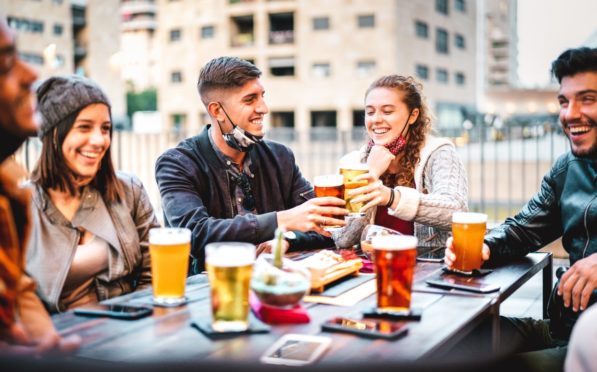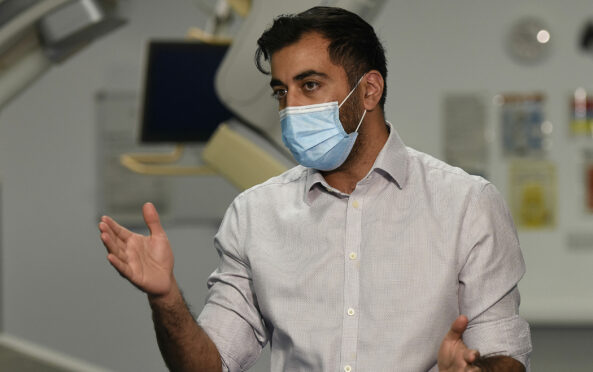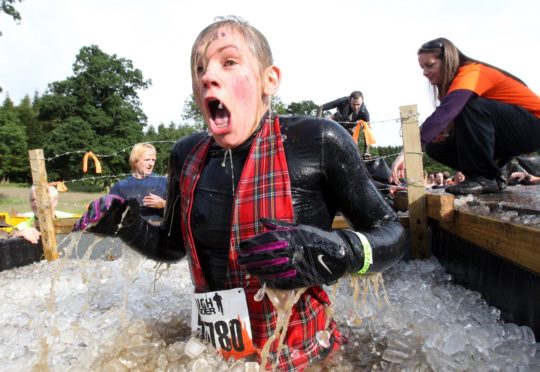
More than 70% of hospitality venues have not registered with a Scottish Government app designed to speed up contact tracing and contain outbreaks.
Dundee, which has been hardest hit by the third wave of infections, has the lowest take-up of the Check In Scotland app on mainland Scotland, with just 14% of venues registering.
The app, which was launched in April, automatically sends contact details to the NHS when customers scan a QR code with their mobile phone when they enter and leave premises.
The take-up figures can be revealed after a week when a record number of positive cases were identified and national clinical director Jason Leitch admitted the country’s contract tracing system was under increasing strain.
The proportion of positive cases waiting more than 48 hours to be contacted by tracers rose to 28% last week, up from 15% in the previous week. Leitch said the delays can lead to bigger outbreaks.
Hundreds of cases have been linked to the Euros football tournament, with mostly young men often gathering indoors in pubs and houses to watch matches. About 90% of the 1,991 cases linked to the Euros by Public Health Scotland last week were male.
Launching the app on April 26, chief medical officer Dr Gregor Smith said: “Check In Scotland will help contact tracers reach people faster if there are coronavirus cases linked to a venue they have recently visited. The faster we can contact people who might have been exposed to Covid-19, the faster we can stop the spread of the virus, and keep moving towards the return of everyday activities.”
Stephen Reicher, who is professor of Social Psychology at St Andrews University and advises the UK and Scottish governments, said: “The reason businesses aren’t registering for the app could be because they think it’s all over, which is a really dangerous perception, because it’s not. If you think it’s all over and do nothing about it you get into trouble.
“Contact tracing quickly is absolutely critical to stopping the spread of infection and this app is one element that allows it to be done quickly, so we need to make these things work really well.
“Anything that can speed that up and make it easier to know where people have been in order to alert people quickly is really important.
“It’s got to be within 48 hours or it’s absolutely pointless, so the contact-tracing figures in Scotland are worrying. Speed is of the essence. If you take too long to contact people they are going to be out and about spreading the disease.”
By law, anyone entering a licensed premises must give their name and telephone number so NHS tracers can alert close contacts of those who test positive and ask them to isolate.
The figures obtained by The Post show take-up of the app is lowest in Dundee, with 14% of venues registering, and highest in Perth and Kinross, where just more than half have registered. Take-up in Edinburgh, Glasgow and Aberdeen is just over 30%.
Some businesses have set up their own electronic systems but many still use pen and paper to take details, which can slow down the contact tracing process.
Paul Togneri, from the Scottish Beer and Pub Association, said: “We’ve sought to highlight the benefits of the Check In Scotland system. If someone does test positive all that information is held centrally. Instead of the contact tracers phoning a business and saying we need all this information, they would already have it.”
Leon Thompson, executive director of UKHospitality Scotland, said: “The app is straightforward and much easier than a clipboard and a pen. It also removes the issue where customers don’t want to give their name and number. It allows staff to get on with the business of serving customers.
“Certainly our members are using it, as far as I’m aware, but there are a lot of small businesses out there who are not signed up to it. Maybe they need more information about it. Local authorities are on the ground making sure businesses are complying with the regulations. The system is in place and it’s going to be there for some time so they have to reach more businesses.”
Stephen Montgomery, from trade body the Scottish Hospitality Group, said: “The app is a helpful thing because it takes the burden off the business itself. It saves us from dealing with data protection issues because the data goes straight to NHS Scotland. They then have all the details to hand and it ensures those details are accurate.
“It does away with the issue where we are held liable for people giving false names. We can only ask what their names are. We’re not the Covid police. We can’t be expected to take the blame if there are 10 Nicola Sturgeons in the one place at one time, which has happened.”
The Scottish Government said the app is voluntary and it is up to venues to decide what method they prefer to use to collect contact details, adding: “Check In Scotland will help contact tracers reach people faster if there are coronavirus cases linked to a venue they have recently visited. We continue to encourage non-mandated businesses and settings to collect contact details and consider using Check In Scotland to do this.”
OPINION
Letting Covid rip would be a dangerous strategy
– Stephen Reicher
We’ll never break the link between Covid infection and hospitalisation but we are weakening the link.
There will be fewer people in hospital, that’s good, but you shouldn’t overstate the case. If a lot of people are infected a small percentage will be hospitalised, but a small percentage of a large number of people is still a lot of people. If you let the infection completely rip through the population you’ll get large numbers of people hospitalised and potentially large number of people who will die.
We’re also learning more about Covid being a nasty disease – something like 40% of all people have symptoms after 12 weeks, so it endures. Long Covid is not something we want. The notion that if you get infected it doesn’t matter now because of vaccines, well that’s a false assumption.
We don’t know how long immunity lasts, we don’t know when it’s going to fade. We don’t know when the disease will breach our defences. Being complacent and saying let infection rip is a very dangerous strategy.
The more infection you have the more the virus reproduces the more it mutates and the greater the probability there is of getting a new variant that escapes vaccines.
If you have a reservoir of the disease, when the conditions get worse infections will spike again. That’s what happened last year and it will happen this year. The way to ensure we don’t have problems in the autumn again is to suppress infections.
While people are not dying in the same numbers we are seeing deaths going up from a low base, we are seeing hospitalisations going up. It’s not yet a catastrophe but it’s not ok to be complacent.
Professor of Social Psychology at the University of St Andrews Stephen Reicher advises the UK and Scottish governments

Enjoy the convenience of having The Sunday Post delivered as a digital ePaper straight to your smartphone, tablet or computer.
Subscribe for only £5.49 a month and enjoy all the benefits of the printed paper as a digital replica.
Subscribe
